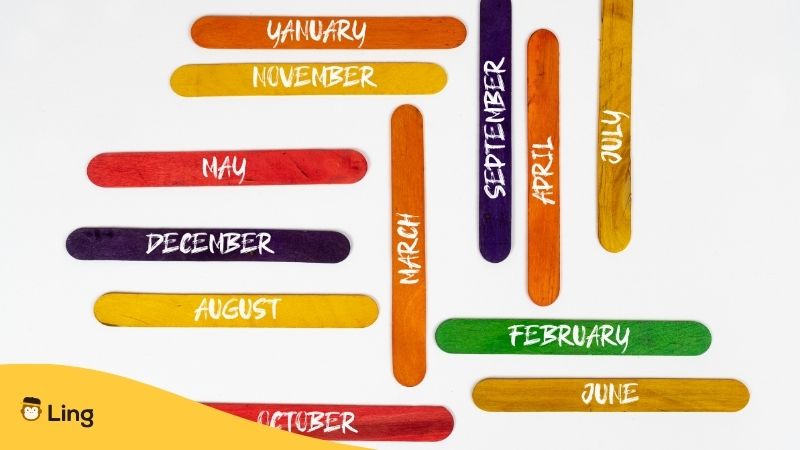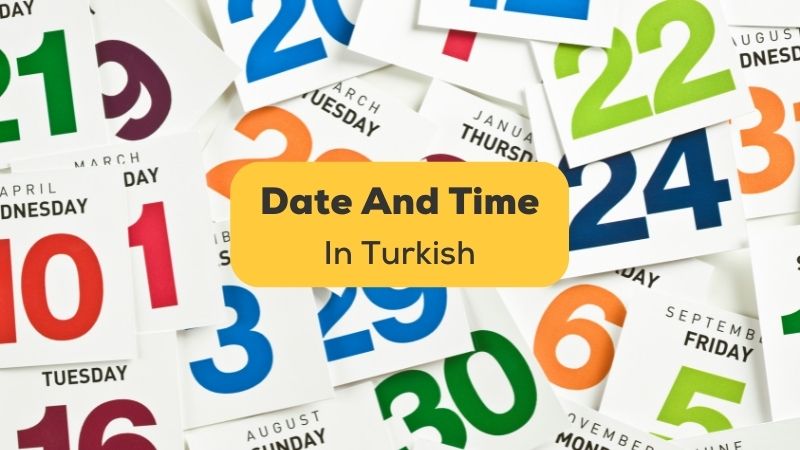Are you having trouble understanding the bus or train schedules in Turkey? You can learn the date and time in Turkish right now!
One of the essential topics that you should learn in a new language is telling the date and time. You’ll have to know the date and time vocabulary to read and understand the schedules for public transportation in Turkey. However, if you don’t know Turkish numbers yet, you can go through our previous post about numbers in Turkish!
Page Contents:
- Days Of The Week In Turkish
- Months In Turkish
- Turkish Date Format
- How To Ask The Time In Turkish?
- How To Tell The Time In Turkish?
- Adverbs Of Time In Turkish
- Learn Turkish With Ling App!
Days Of The Week In Turkish
One of the essential topics in A1 Turkish is the days of the week and it may sound weird to you but unlike in the English language, the week starts on Monday in Turkish, not Sunday. You should know the days to arrange meetings with people or buy tickets.
Here are the days of the week in Turkish:
- Monday – Pazartes pzt
- Tuesday – Salı sal
- Wednesday – Çarşamba çrş
- Thursday – Perşembe prş
- Friday – Cuma cum
- Saturday – Cumartesi cmt
- Sunday – Pazar pzr
Q: Bugün günlerden ne? (What day is it today?)
A: Bugün cuma. (Today is Friday.)
Months In Turkish

Knowing months in Turkish is as important as days because, otherwise, how would you tell your birthday?
- January – Ocak
- February – Şubat
- March – Mart
- April – Nisan
- May – Mayıs
- June – Haziran
- July – Temmuz
- August – Ağustos
- September – Eylül
- October – Ekim
- November – Kasım
- December – Aralık
Q: Senin doğum günün ne zaman? (When is your birthday?)
Seasons In Turkish
Fun Fact: “ilkbahar” literally means “the first spring” and “sonbahar” literally means “the last spring” in English.
Turkish Date Format
Now that you’ve learned the days of the week and months of the year, it’s time to put it all together in Turkish date format. This is the simplest part.
As in many other languages, in Turkish, you write the date as DD/MM/YYYY. For instance, if you’re writing “April 2, 2019,” it would be 2 Nisan 2019 in Turkish. Note that the month is capitalized, but only when it appears on an exact date.
The answer doesn´t need a detailed explanation. The day number, followed by the month´s name, and finally the year.
How To Ask The Time In Turkish?
There are two ways to ask the time in Turkish for different purposes:
You can use this phrase to ask the current time on the clock
You can use this phrase to ask when will something take a place
How To Tell The Time In Turkish?

There is one thing you need to know about hours in Turkish. As you know, there is a difference between AM and PM but that’s not the case in Turkish. For example, 2 PM corresponds to 14:00 in Turkish. So after 12, it goes on like 1 PM – 13:00, 2 PM – 14:00, 3 PM – 15:00 until 23:59 then it resets at midnight 00:00.
On The Hour – Tam Saat
- 03:00 – Saat üç. (It’s 3 AM.)
- 05:00 – Saat beş. (It’s 5 AM.)
- 10:00 – Saat on. (It’s 10 AM. )
- 18:00 – Saat altı. (It’s 6 PM.)
- 21:00 – Saat dokuz. (It’s 9 PM.)
Quarter Past – Çeyrek
Saat + number + “-ı, -i, -u, -ü” + çeyrek geçiyor.
- 03:15 – Saat üçü çeyrek geçiyor. (It’s quarter past three.)
- 05:15 – Saat beşi çeyrek geçiyor. (It’s quarter past five.)
- 10:15 – Saat onu çeyrek geçiyor. (It’s quarter past ten.)
- 18:15 – Saat altıyı çeyrek geçiyor. (It’s quarter past six.)
- 21:15 – Saat dokuzu çeyrek geçiyor. (It’s quarter past nine.)
Half Past (Buçuk)
Saat + number + buçuk
- 03:30 – Saat üç buçuk. (It’s half past three.)
- 05:30 – Saat beş buçuk. (It’s half past five.)
- 10:30 – Saat on buçuk. (It’s half past ten.)
- 18:30 – Saat altı buçuk. (It’s half past six.)
- 21:30 – Saat dokuz buçuk. (It’s half past nine.)
Quarter to (Çeyrek var)
Saat + number + “-a, -e” + çeyrek var.
- 03:45 – Saat dörde çeyrek var. (It’s quarter to four.)
- 05:45 – Saat altı(y)a çeyrek var. (It’s quarter to six.)
- 10:45 – Saat on bire çeyrek var. (It’s quarter to eleven.)
- 18:45 – Saat yediye çeyrek var. (It’s quarter to seven.)
- 21:45 – Saat ona çeyrek var. (It’s quarter to ten.)
Adverbs Of Time In Turkish
After learning the date and time in Turkish, why don’t you learn more Turkish with the help of the Ling App?
Learn Turkish With Ling App!
If you want to learn Turkish or any other language, waste no more time and check out the Ling App right now!

Ling is a language-learning app designed to help language learners from the beginning of their language-learning journeys. Ling App consists of different engaging activities, from writing and listening exercises to an AI chatbot to practice your speaking skills, and with much more, the Ling App offers you everything you’re looking for in a language learning app.
Also, don’t forget to visit Ling’s Turkish blog for weekly articles about the Turkish language and culture!
Trust me; you won’t regret it if you give Ling a try for FREE by downloading it from the App Store or Play Store.
Until next time! Hoşçakalın!































































